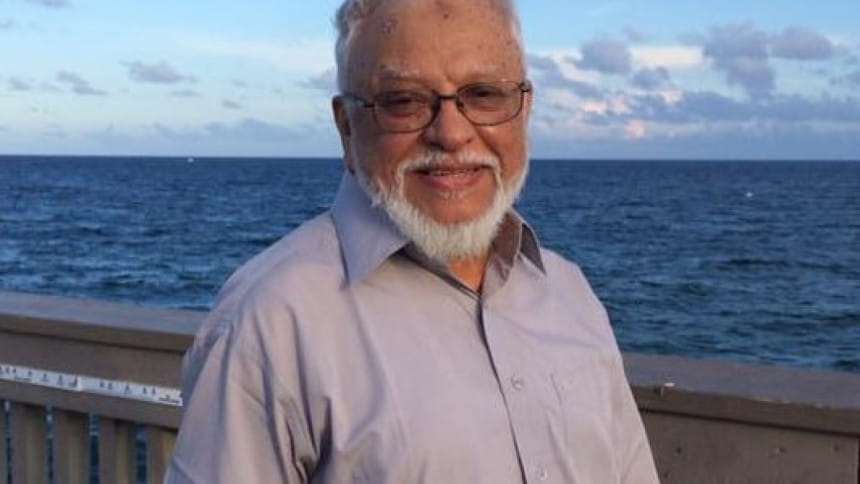Abu Osman Chowdhury: An unsung hero of the war of liberation

Not many people today may be aware of the contributions made by Lt Col (retd) Abu Osman Chowdhury, who died on September 5, 2020, in our War of Liberation. Abu Osman Chowdhury, then a major and commander of the 4th wing of East Pakistan Rifles (EPR) located at Chuadanga, revolted against the killing of innocent Bengalis on the night of March 25, 1971 by the Pakistani military, and set up South Western Command with the elected representatives of Chuadanga. Meanwhile, the Punjabi SDO of Chuadanga was passing information about the revolt through telegrams and telephones. Before the non-Bengali officers, Junior Commissioned Officers (JCOs) and others serving in the EPR could undertake countermeasures, they were neutralised pre-emptively. The treasury was seized to meet the future expenditure of the Liberation War efforts.
On the night of March 25/26, a company of 155 personnel of the 27th Baluch Regiment reached Kushtia under the command of Pakistani Major Shoaib. They were deployed in Kushtia Police Line, VHF Station and Telephone Exchange. Three companies of the 4th wing of EPR along with police, Ansar, the local youth and Awami League supporters attacked the Pakistani positions at 3:45 am, leading to the fall of the Police Line. Twenty Baluch soldiers were killed, and the rest ran away. Simultaneously, the VHF Station and Telephone Exchange were attacked at 3:45 am under the command of Major Osman. Losing 25 soldiers, Major Shoaib asked for reinforcements and air support from his superiors. His request was declined, and so he started fleeing towards Jashore—leaving 90 dead bodies behind—with the remaining 65 soldiers in 6 jeeps, 1 pick-up and one 3-ton truck. He was in his jeep at the front of the convoy, with its lights turned off. The jeep fell into a roadside ditch while trying to avoid a broken culvert 25 miles off Kushtia on the Jashore-Kushtia road. Osman's forces then attacked them and killed 56 Baluch soldiers. The remaining nine ran away to a nearby village, where the villagers also killed them including Major Shoaib.
In India, Major Osman reportedly handed over 40/50 KGs of gold and 40 millions of Pakistani Rupees to the government-in-exile. Few doubted that he probably did not deposit all the money and gold he seized from the treasury. This rumour, unchecked and unchallenged, was making the rounds and gradually snowballed. Major Osman's heroism and bravery would extinguish all propaganda but this rumour left a stain on his career subsequently.
Later, the South Western Command was divided into two sectors: sector 8 and 9. Major Osman was entrusted with the command of sector 8. In August, he was suddenly and unceremoniously dumped as the Assistant Chief of Logistics, a non-functional position. Concerned people were given an idea that he had to be posted elsewhere to make way for Major MA Manzur, as the latter was senior to him. Major Osman himself was senior to three other sector commanders. Any one of these three commanders could be placed elsewhere to accommodate Major Manzur. As well as sector 8, Manzur was also given the additional charge of sector 9 after Major MA Jalil was removed from his post. Instead of giving Manzur the additional charge of sector 9, Major Osman could be entrusted with the command of that sector.
At the Officers' Training Academy in Murti, Siliguri, we heard that Major Osman fought far better than other sector commanders. So he became an icon to us. His sudden posting as Assistant Chief of Logistics saddened us. MA Rouf, ex-president of East Pakistan Chhatra League and MP, had been the Political Motivator of the training academy as well as the Freedom Fighters' Training Centre. He confided in SK Kamal and me that General MAG Osmani had not been happy about Osman's style of command and activities. He replaced him with Manzur on the pretext of honouring a senior. Major Manzur allegedly unearthed some objectionable activities of his predecessor as per instructions of the commander-in-chief. Rouf Bhai concluded: "Indian intelligence agencies caught two EPR soldiers with a huge amount of money inside a bank. Under interrogation, they confessed that they were hired by a senior Bangladeshi army officer to assassinate Major Manzur!"
The gallantry award for Liberation War was declared in December 1973. All sector commanders were awarded Bir Uttom, except Major Osman and Major MA Jalil. Even Major AR Azam Choudhury, second-in-command of the 4th wing of EPR under Major Osman, was awarded Bir Bikrom. According to Azam Choudhury, if he got the Bir Bikrom award, his commander Osman should have been given "Double Bir Sreshtho". BDR Captain Muzaffar Ahmed, a Bir Protik officer who fought under Osman as a Naib Subedar in 1971, made a similar comment as he told me: "Sector commanders are Tigers and Major Osman is the only lion of the war-time army."
As director of the Supply and Transport Directorate, AHQ, Abu Osman Chowdhury came to Jashore Cantonment on an official visit in 1972. Astonishingly, Col Manzur, commander of the 55th Brigade, Jashore, instructed Major MA Matin, president of the Mess Committee, not to organise any reception dinner nor accommodate Major Abu Osman Chowdhury in a VIP room! To justify his action, Col Manzur confided in us the story of the so-called plot to assassinate him by Major Osman, which I first heard about in Murti from Rauf Bhai. Anyone who knew Lt Col Osman could never believe that he could be part of such nefarious schemes to embezzle funds or assassinate a fellow comrade.
While his contemporaries were given a minimum of two promotions, he got only one (from Major to Lt Col). Besides being deprived of any gallantry award, his performance and seniority remained unrewarded even in terms of promotion. Last but not the least, he was prematurely retired in 1976. In Pakistan, there is a commemorative plaque in memory of the 155 soldiers of Baluch Regiment at the Baluch Regimental Centre and a memento containing the names of the troops killed in the battle against the 4th wing of EPR in Kushtia. Probably, the Awami League government honoured Major Osman with the appointment of Zilla Parishad chairman and award of Swadhinata Padak as a consolation.
Muhammad Abul Hossain is a retired major and a freedom fighter.

 For all latest news, follow The Daily Star's Google News channel.
For all latest news, follow The Daily Star's Google News channel. 



Comments